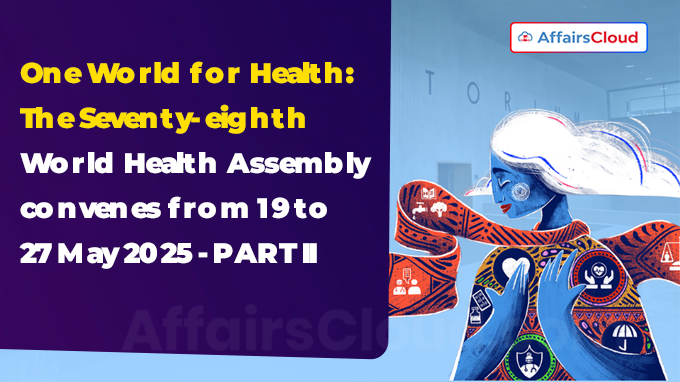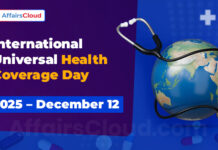 In May 2025, the 78th World Health Assembly (WHA78) concluded in Geneva(Switzerland) , marking a pivotal moment in global health governance. This annual gathering of the World Health Organization’s (WHO) 194 Member States resulted in several landmark decisions aimed at strengthening global health systems and preparedness.
In May 2025, the 78th World Health Assembly (WHA78) concluded in Geneva(Switzerland) , marking a pivotal moment in global health governance. This annual gathering of the World Health Organization’s (WHO) 194 Member States resulted in several landmark decisions aimed at strengthening global health systems and preparedness.
WHA Adopted Landmark Pandemic Agreement:
During the plenary session of WHA 78, the member states of WHO formally adopted the world’s 1st agreement related to pandemic, WHO Pandemic Agreement, culminating over three years of intensive negotiations launched by the governments in response to the devastating impacts of the COVI-19 pandemic.
- This newly adopted agreement aimed to make the world safer from- and more equitable in response to future pandemics.
About WHO Pandemic Agreement:
i.It is the 2nd international legal agreement negotiated under Article 19 of the WHO constitution.
- In 2003, WHO adopted WHO framework Convention on Tobacco Control, which came into force in 2005.
ii.The agreement outlines the principles, approaches, and tools for better international coordination across a diverse range of areas, in order to bolster the international health system for pandemic prevention, preparedness and response.
iii.The agreement will come into effect after ratification by a minimum of 60 countries. Meanwhile, discussions on the Pathogen Access and Benefit-Sharing (PABS) system will continue, with final decisions expected at the 2026 WHA.
v.Under the agreement, pharma manufacturers in the PABS system must ensure equitable access by allocating 20% of their real-time production of vaccines, therapeutics, and diagnostics to WHO rapid response.
Awards & Recognition at WHA 78:
Director-General’s Award for Global Health:
In May 2025, DG of WHO Dr. Tedros Adhanom Ghebreyesus conferred the DG’s Award for Global Health 2025 to Professor Awa Marie Coll Seck (Senegal) and Professor Sir Brian Mellor Greenwood (the United Kingdom, UK), during a high-level meeting at WHA 78.
- They received this award in recognition of their exceptional contributions that have helped to reduce the burden of malaria and other vaccine-preventable diseases and to build sustainable health system capacity in Africa.
- This year, each recipient received an honorary lifetime achievement award.
i.Professor Awa Marie Coll Seck has been instrumental in strengthening health systems and promoting public health initiatives in Senegal and across Africa. Her leadership has significantly impacted health policy and implementation in the region.
ii.Professor Sir Brian Mellor Greenwood is renowned for his groundbreaking research in infectious diseases, notably malaria. His work has been pivotal in developing strategies for disease prevention and control, benefiting populations worldwide.
Note: DG’s Award for Global Health was established in year 2019.
WHO Recognised 4 Countries for Eliminating Industrial Trans Fats from Food
In May 2025, 4 countries namely, Austria, Norway, Oman and Singapore were recognised by WHO for their exemplary efforts in eliminating industrially Produced Trans fats (iTFA) from their national food supplies.
- WHO DG Tedros Adhanom Ghebreyesus presented the WHO validation certificates for 2025 to these countries during the WHA 78.
- With this, total number of countries validated for eliminating iTFA increases to 9, including Denmark, Lithuania, Poland, Saudi Arabia, and Thailand (which were recognised by WHO in 2024).
Key Programmes and Targets to Eliminate TFA:
i.In 2018, WHO called to eliminate industrially produced trans fats worldwide. At that time, only 11 countries accounting just 6% of the world population, had adopted best-practice policies.
- By March 2025, around 60 countries have best-practice policies in effect, representing 46% of the world population.
ii.WHO aims to cover countries that account for at least 90% of the global TFA burden with best-practice policies by the end of 2025, and at least 70% within each region.
iii.WHO recommends the countries to implement best-practice TFA elimination policies either by restricting TFA to 2 grams (gms) per 100 gms of total fat in all foods and or/by banning the production and use of Partially Hydrogenated Oils (PHOs) as an ingredient in food products.
Note: Trans Fats, also known asTrans-Fatty Acids (TFA), are unsaturated fats that present in both industrial and natural resources.
Mauritius & Maldives Awarded WHO DG Special Recognition for Tobacco Control:
Mauritius and Maldives were recognised with the WHO DG Special Recognition Award for 2025 as part of the World No-Tobacco Day 2025(May 31), in recognition of its exceptional efforts in tobacco control.
- Anil Kumar Bachoo on behalf of the Ministry of Health and Wellness, Republic of Mauritius, along with Dr. Mohamed Muizzu, President of Republic of Maldives, received this award from the DG of WHO during the inaugural day of WHA 78.
Key Points:
i.Every year, WHO recognizes individuals and organisations from each of the 6 WHO regions for their exceptional contributions to tobacco control.
ii.These awards include: the WHO DG’s Special Recognition Awards; the World No-tobacco Day awards.
iii.This year, WHO bestowed the WHO DG’s Special Recognition certificate award to the Global Centre for Good Governance in Tobacco Control (GGTC), Pathumthani, Thailand.
Click here for the complete list of World No-tobacco Day awards 2025.
Key MoUs at WHA 78:
Six African Countries Signed MoU to Eliminate Kala-azar
In May 2025, 6 African countries namely, Chad, Djibouti, Ethiopia, Somalia, South Sudan and Sudan signed a Memorandum of Understanding (MoU) to eliminate visceral leishmaniasis (also known as Kala-azar) which is one of the deadliest NTD.
- The MoU was signed at an event organsied by the African Union Commission (AU), the Global Onchocerciasis Network for Elimination (GONE) and WHO on the sidelines of WHA 78.
- It was support by the END Fund and non-profit medical research organisation, Drugs for Neglected Diseases initiative (DNDi).
Key Points:
i.As per the MoU, all 6 countries agreed to invest resources, develop effective strategies at the regional level, and foster collaboration to achieve the targets outlined in the Kala-azar elimination framework launched by Eastern African countries in June 2024.
ii.During the event, other African countries like: Cameroon, Niger, Nigeria, Senegal and Tanzania along with 6 signatory countries called for improved cross-border cooperation and concrete collaborative actions to tackle other NTDs.
Other Key Facts:
i.According to DNDi, more than 70% of the global burden of this disease is in the Eastern African region, where 50% of affected children under 15.
ii.As of May 2025, 56 countries have eradicated at least one NTD worldwide, including Togo (4 NTDs) and Benin, Ghana and India (3 NTDs).
Maldives and Thailand Signed MoU to Strengthen Cooperation in Health:
In May 2025, the Ministry of Health of the Republic of Maldives, and the Ministry of Public Health of the Kingdom of Thailand signed a MoU to bolster, promote and develop cooperation and collaboration in health.
- The MoU highlights a broad framework for bilateral cooperation like: support to enhance primary health care in the Maldives and build the regulatory capacity of the Maldives Food and Drug Authority.
- The MoU also covers collaborative efforts including the establishment of training institutions for health professionals, human resource development, policy and system-level health research, the integration of health information technology, and the development of sustainable financing models for health promotion.
Lesotho Ratified WTO Fisheries Subsidies Agreement:
In May 2025, Tsiu Khatibe, Lesotho’s World Trade Organisation (WTO) Ambassador presented his country’s instrument of acceptance of the Agreement on Fisheries Subsidies to WTO DG Ngozi Okonjo-Iweala, during the event held on the sidelines of WHA 78.
- With this, Lesotho became the 99th WTO member to deposit its acceptance of the Agreement with the WTO.
About Agreement on Fisheries Subsidies:
i.In June 2022, Ministers adopted the Agreement on Fisheries Subsidies by consensus at the 12th Ministerial Conference (MC12) of WTO held in Geneva, Switzerland.
ii.The agreement outlines new binding, multilateral rules to prevent harmful fisheries subsidies. It also prohibits subsidies for illegal, unreported and unregulated fishing, for fishing overfished stocks, and for fishing on the unregulated high seas.
iii.The agreement also has a provision of establishing a fund to provide technical assistance and capacity-building to help governments that have formally accepted the Agreement in implementing the new rules.
iv.The Agreement will come into force only when it receives formal acceptances from 2/3rd members of the WTO , representing 111 members.
Argentina Ratified WHO Withdrawal :
In May 2025, Argentina ratified its decision to formally withdraw from WHO during Robert F. Kennedy, health secretary of United States of America (USA) visit to Buenos Aires, capital city of Argentina.
- The government of Argentina has also announced a ‘structural review’ of national health agencies to ‘organize, update, and make transparent the structures and processes’ of the public health system.
- In February 2025, Javier Milei, President of Argentina announced to withdraw its membership from WHO, following in the footsteps of his USA counterpart Donald Trump who had announced in January 2025, that USA would withdraw.
WHO & AU Strengthen Health Alliance with Renewed Strategic Pact at WHA 78
During the WHA 78, the WHO and AU Commission renewed their longstanding strategic partnership in health sector, with the signing of an updated MoU.
- With the signing of this renewed agreement, both organisations reaffirmed their commitment to advancing health security, UHC, and sustainable development across the African continent.
- The agreement was signed by Her Excellency Ambassador Amma Adomaa Twum-Amoah, Commissioner of Health, Humanitarian Affairs, and Social Development on behalf of Chairperson of AU Commission and DG of WHO.
5 Keys Areas of Collaboration:
i.Health Systems Strengthening: It includes regulatory harmonization, support for local pharmaceutical manufacturing, traditional medicine, local health financing, among others.
ii.Reproductive, Maternal, Neonatal, Child, and Adolescent Health (RMNCAH): It will continue to support the Campaign on Accelerated Reduction of Maternal Mortality in Africa (CARMMA Plus 2021-2030) and advancement of the reviewed Addis Ababa Declaration on Immunization (ADi).
iii.Disease Prevention and Control: It aims to support the implementation of AU frameworks on communicable and non-communicable diseases like: efforts to end Acquired Immunodeficiency Syndrome (AIDS), TB, and Malaria; eliminate NTDs; and address the burden of viral hepatitis in with WHO strategies.
iv.Nutrition and Food Security: It aims to bolster the nutrition agenda through implementation of the Africa Strategy 2015-25 and related WHO strategies.
v.Health in Emergency Settings: It will strengthen joint responses to humanitarian crises, conflicts, and climate-related emergencies.
Other Key Highlights:
WHO Confirmed End of Polio Epidemic in Madagascar:
In May 2025, WHO officially confirmed the end of polio epidemic in Madagascar, with no new cases reported since September 2023. Madagascar has successfully prevented the transmission of variant poliovirus type-1 in its country by following the recommendations from a rigorous independent Outbreak Response Assessment (OBRA) to declare the outbreak closed.
- The outbreak, which started in 2020, affected the health of public, particularly to children under the age of 5 and unvaccinated adults.
Key Criteria for Certification:
The WHO has outlined key criteria for the certification to be met:
i.A country is required to ensure high population immunity;
ii.Robust surveillance performance (evidence that no transmission was missed);
iii.At least 12 consecutive months without polio virus detection (either in humans, or environmental- sewage or wastewater).
Other Key Highlights:
i.WHO adopted a historic resolution to reduce the burden of NCDs by promoting kidney health and bolstering the prevention and control of kidney disease. This resolution marks the 1st time that kidney health is prioritized on the world health agenda.
- This resolution is advocated by the International Society of Nephrology (ISN), supported by the European Kidney Patients’ Federation (EKPF) and other stakeholders.
ii.WHO member states rejected a proposal to invite Taiwan to annual WHA after China raised its objection. Belize and Saint Vincent and the Grenadines who are among the just 12 remaining countries, who have formal diplomatic ties with Taiwan, proposed to invite Taiwan as an observer in this year’s WHO annual health assembly.
iii.The Government of the Republic of Croatia donated a bronze sculpture, ‘Shape of Space’ which was unveiled during a ceremony held at Headquarters of WHO i.e. in Geneva (Switzerland).
- The newly inaugurated sculpture (which is more than 2.5 metres tall) was created by noted Croatian artist Ivan Kozaric, pays tribute to health workers around the world.
- It also honours the 1st President of WHA, Dr. Andrija Stampar, who is considered a founding figure in modern public health.
About World Health Organisation (WHO):
Director General (DG)- Dr. Tedros Adhanom Ghebreyesus
Headquarters- Geneva, Switzerland
Established – 1948




